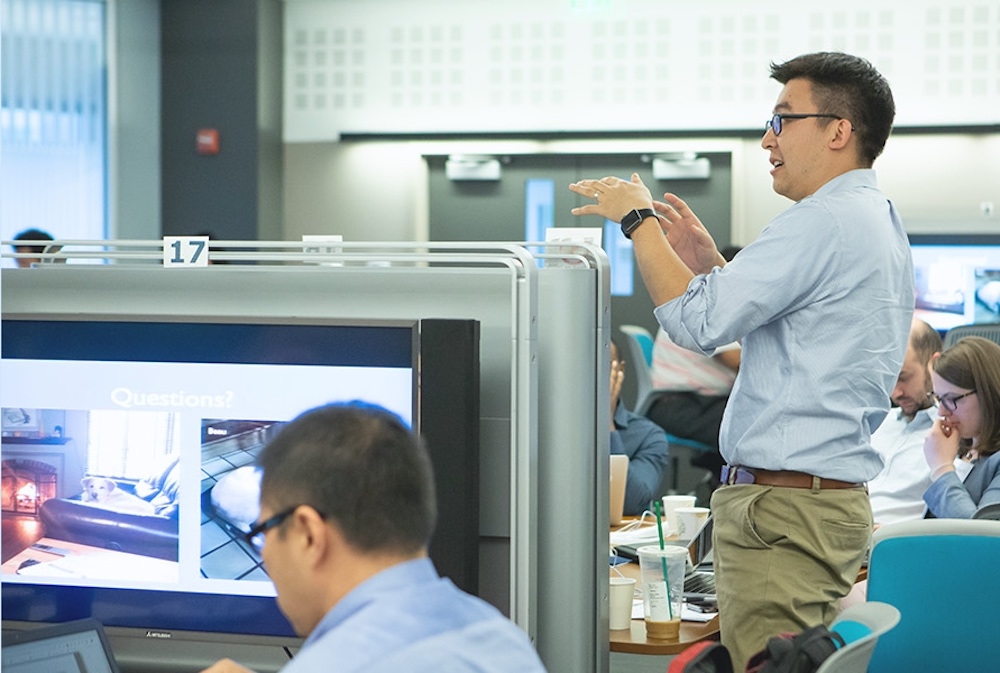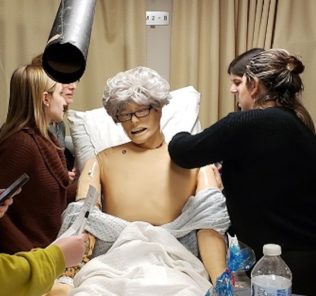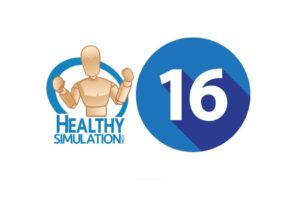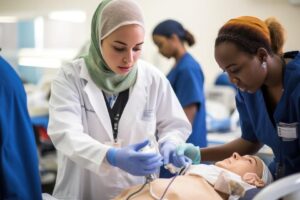Why Consider MGH Institute’s Simulation-based Education (SBE) and SimOps Programs?
As clinical simulation-based education (SBE) becomes more common across healthcare curriculums geared toward medicine and nursing, institutions have established specific programs to enhance the learner experience. One such institution, the MGH Institute of Health Professions currently provides Simulation-based Education (SBE) through a Master’s in HPEd-Simulation Operations degree program which opened enrollment in April 2021. Today, this program has been able to demonstrate deeper and transformational learning through experience and reflective discussions.
To further support the power of healthcare simulation, the MGH Master’s in HPEd-Simulation Operations allows learners to acquire knowledge and practice skills in the areas of simulation technology, simulation-based education, leadership communication, organizational buy-in, and program management. Courses provide many of the knowledge and skills outlined in the CHSOS study guide and the SimGHOST capability framework.
With rolling admissions (January and September start dates), this is a 2-year program year-round with up to 5-years if needed. A previous bachelor’s degree is required, but no GRE is needed. Additionally, there is a curriculum for MS-HPEd in Simulation. This program is currently completely online (all virtual during COVID-19).
Sponsored Content:
With 30 to 33 necessary credits, the Curriculum Plan required courses in the MS-HPEd degree (33 credits). Two core required master course electives in simulation operations (6 credits) are also required. The culmination of the program is a scholarly simulation project, presented to all fellow MS students in a 3-day online seminar and a manuscript, suitable for publication.
“After ten years in healthcare simulation, I knew that my career needed to move to the next step. I have been waiting for a program like MGH that was available online and with an impeccable reputation,” said Billie Paschal, the Simulation Educational Program Manager with the University of North Texas Health Science Center. “The course work has tied in nicely with my new role as an Education Program Manager. It has helped me advance the simulation experiences at our center. The faculty and administration are many of the leaders in healthcare simulation research.”
Note: Comparable prior coursework (up to 12 credits) may be eligible to apply toward degree requirements. Three credits can be waived with a CHSE certificate and two years of full-time simulation center experience. There are further Simulation offerings that complement your degree in addition to the required credits.
More About the MGH Institute of Health Professions
Sponsored Content:
MGH Institute of Health Professions is a graduate school in Boston with more than 1,600 students. The institution offers unparalleled opportunities for faculty and students to learn and work alongside expert practitioners in the field of health care simulation.
Entry-level and post-professional programs in Nursing, Communication Sciences and Disorders, Genetic Counseling, Occupational Therapy, Physical Therapy, and Physician Assistant Studies are among the Institute’s offerings. Other programs, including a Ph.D. in Rehabilitation Sciences and a Ph.D. and Master of Science in Health Professions Education, have been added to meet the rising demand for highly educated health care professionals, educators, and researchers.
Integrating classroom learning with research and clinical experience, the Institute grants doctoral degrees, and master’s degrees awards certificates of advanced study, and offers continuing education to practicing professionals, as well as to baccalaureate-educated individuals entering health care from another field.
The MGH Institute, which is accredited by the New England Commission of Higher Education (NECHE), has more than 1,600 full- and part-time students. Since its founding in 1977 by Massachusetts General Hospital as an independent, not-for-profit graduate school, it has produced 9,000+ graduates.
Learn More About SBE and SimOps
Lance Baily, BA, EMT-B, is the Founder & CEO of HealthySimulation.com, which he started while serving as the Director of the Nevada System of Higher Education’s Clinical Simulation Center of Las Vegas back in 2010. Lance is also the Founder and acting Advisor to the Board of SimGHOSTS.org, the world’s only non-profit organization dedicated to supporting professionals operating healthcare simulation technologies. His co-edited Book: “Comprehensive Healthcare Simulation: Operations, Technology, and Innovative Practice” is cited as a key source for professional certification in the industry. Lance’s background also includes serving as a Simulation Technology Specialist for the LA Community College District, EMS fire fighting, Hollywood movie production, rescue diving, and global travel. He and his wife Abigail Baily, PhD live in Las Vegas, Nevada with their two amazing daughters.
Sponsored Content:


















